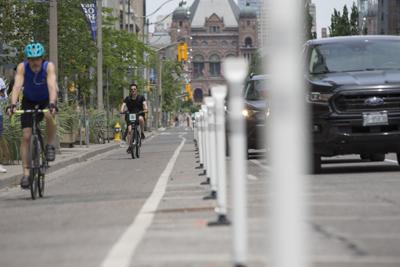Premier Doug Ford’s plan to tear up º£½ÇÉçÇø¹ÙÍøbike lanes has Mayor Olivia Chow looking for options to fight provincial “overreach” in city affairs.
In published Thursday, Chow said new Ontario legislation that would empower Ford’s government to remove bikeways reducing space for cars would “overturn the decisions and work of our locally elected º£½ÇÉçÇø¹ÙÍøcity council.”
If the bill passes “one government would, at tremendous cost to the taxpayer and without collaboration, undo another government’s work,” warned the motion, which is entitled “Respecting Local Democracy and Cities.”
Chow wrote that as mayor “it is my responsibility to stand up for the decision-making authority of city council,” and she’s consulting with staff “to review the city’s options.” She said recommendations will come forward before the start of council’s meeting on Nov. 13.Â
The motion didn’t provide details about what, if anything, the city could do to confront Ford’s plans on bike lanes — which include demolishing those on sections of Bloor Street, University Avenue and Yonge Street — and other issues the municipality considers outside provincial jurisdiction. In general, Queen’s Park has near complete legislative authority over Ontario cities.Â
Chow’s press secretary Arianne Robinson would only say the mayor is looking for ways to defend council’s decision-making powers “in light of recent overreach” by the province.Â
The mayor’s motion is the latest sign that Ford’s bike lane salvo is straining his relationship with Chow. Early in her administration the Conservative premier and former New Democrat MP teamed up on issues like a “new deal” to bail out Toronto’s finances. But in recent weeks Chow has hit Ford’s government with sharper criticism over its bikeway gambit, which many observers see as an effort by the premier to shore up public support ahead of an early election call next spring.
The province’s Bill 212, the Reducing Gridlock and Saving You Time Act, was introduced last month and would require cities to seek provincial permission to install bike lanes that require removing a lane of vehicle traffic.Â
Last week, the province posted a further amendment to the Environmental Registry of Ontario that “would require the province to remove sections of the Bloor Street, Yonge Street and University Avenue bike lanes in the City of º£½ÇÉçÇø¹ÙÍøand return them to a lane of traffic for motor vehicles.”Â
Ontario Transportation Minister Prabmeet Sarkaria has argued bike lanes should be removed from major streets because they cause gridlock and only a small minority of residents cycle regularly. That’s disputed by cycling advocates and experts who argue the bikeways have minimal effects on traffic and are necessary to keep riders safe and help meet climate goals.
Asked about Chow’s motion Thursday, the Ford government signalled it was within its rights to make decisions about Toronto’s road network.Â
“º£½ÇÉçÇø¹ÙÍøis the economic driver of this country, and gridlock has reached a crisis levels — costing the economy $11 billion in lost productivity each year,” said Sarkaria’s spokesperson Dakota Brasier, citing a figure from the º£½ÇÉçÇø¹ÙÍøRegion Board of Trade.
She said the Ford government supports “a common-sense approach to bike lanes — one that doesn’t involve removing vital traffic lanes on some of our busiest roads.”Â
“The city’s current approach is clearly not working. Our government is stepping up to address the problem head-on and paying the costs to fix the mess,” she added.Â
The province has promised to reimburse cities for the cost of removing bike lanes it deems to be impeding car traffic. But earlier this week, º£½ÇÉçÇø¹ÙÍøCity Manager Paul Johnson said that if Queen’s Park goes ahead with the plan, the municipality would demand Ontario also pay the city back for money it spent to design and install the bikeways.Â
“I’m not prepared to say well, all the staff time and all the planning time and all the other time we had working on this as well, that’s out,” Johnson told CBC’s Metro Morning on Tuesday. “I don’t think the city of º£½ÇÉçÇø¹ÙÍøtaxpayers should pay twice for this.”
He predicted the bill would run into the millions of dollars.Â
Sarkaria has suggested that the value of increased productivity from easing gridlock would outweigh the municipality’s sunk costs on the bikeways, and the province says it has no intention of compensating the city for money spent to install the lanes.



























To join the conversation set a first and last name in your user profile.
Sign in or register for free to join the Conversation